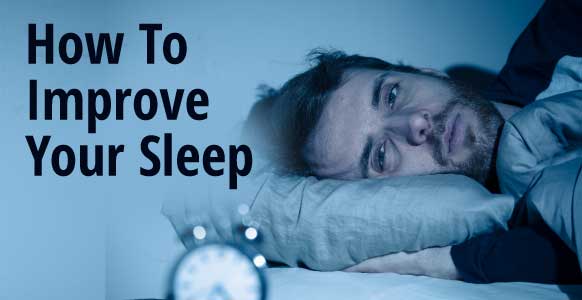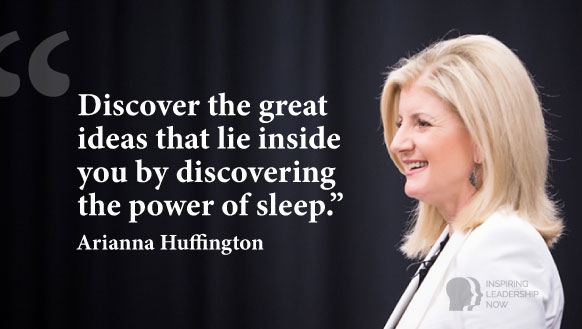Last updated: 17 March 2020

It’s probably one of the most underrated life skills that every leader should look into… how to improve your sleep.
There is a ton of research on sleep and you are probably aware of how it messes with your cognition, decision-making, mood when you don’t have enough of it.
Working late, sending habitual late night emails and pulling all-nighters can make your working days more of a challenge than if you were well rested.
But did you know that a lack of sleep is proven to have a negative effect on your skills as a leader?
A decent night’s sleep is an important, yet largely overlooked factor in good leadership.
A whopping two thirds of adults in developed nations fail to get the average 8 hours sleep per night.
The standard 8 hours isn’t a random figure, it is officially recommended by the World Health Organisation and the National Sleep Foundation to be a healthy nightly average.
Although what’s actually needed can vary from individual to individual, it is considered to be a healthy benchmark.
A Sleep Deprivation Epidemic
So many of us are side-lining sleep in favor of working late and work-related evening screen time that the WHO has now declared a sleep-loss epidemic throughout industrialized nations.
If you aren’t getting your 8 hours – you are part of this epidemic.
It has an enormous impact on health; not simply affecting your ability to concentrate, but also causing havoc to your overall health and well being, leading to a raft of diseases and conditions. More that you might have realized! The effects of missing out on sleep is a real eye opener (pun intended!).
Let’s have a look at some of the effects of short-changing yourself on the 8 hours of nightly sleep you are due.
The Health Effects Of Not Getting Enough Sleep
Not getting enough shut-eye leads to a severely weakened immune system, and according to medical research, more than doubles your risk of cancer.
It is also a determining factor in whether or not you will develop Alzheimer’s disease.
Insufficient sleep, even if just for a week, messes with your blood sugar levels to the extent that you would be classified as pre-diabetic.
Add to this that a lack of sleep increases the likelihood of cardiovascular disease, stroke and congestive heart failure owing to your arteries becoming blocked and brittle.
Essentially the shorter you sleep, the shorter your life span.
That’s not all – sleep disruption is a contributing factor to all major psychiatric conditions including depression, anxiety and suicidal tendencies.
If that wasn’t enough, being sleep deprived can even make you stack on the pounds.
Have you ever noticed your desire to eat more when you are tired?
That is because having too little sleep increases the concentration of a hormone that makes you feel hungry and suppresses its counterpart hormone, the one that would normally signal food satisfaction.
What this means is that you feel super hungry and despite being full you want to eat more. The worst part is that should you attempt to diet, in your sleep deprived state most of the weight you lose wont be from body fat, it comes from lean body mass.
It might come as no surprise that in this sleep deprivation epidemic throughout the developed nations has seen a dramatic decline in health. The US, UK, Western Europe and parts of Asia have all seen a vast increase in the above mentioned diseases and mental health issues as a direct correlation with the sleep deprivation epidemic.
How Sleep Impacts Your Leadership Skills

At a business level, a lack of sleep has a huge negative impact on your performance and can have a lasting effect on your team.
Research shows that sleep deprived leaders are more irritable, antagonistic, impatient and even abusive – without even realizing it.
This in turn affects the wellbeing and performance of team members, generating a workforce that are disengaged and even prompts unethical behaviour.
It is likely that the disruptive daytime dynamic caused by a super grumpy manager or supervisor will have a negative effect on team members’ sleep patterns, meaning that they are coming to work equally as irritable and unfocused, starting a cascade of poor performance, disengagement and ill-feeling throughout the organization.
Bad times!
Charisma Is Sleep Dependant
Additionally, tired-out leaders are less able to enthuse and inspire as their well-rested colleagues.
Studies reported in the article Sleep Well, Lead Better, have shown that sleep deprived leaders were perceived at 13% less charismatic than those who had not been deprived of sleep.
The reason is that in a tired state you are not able to manage or fake the high energy of a positive mood.
It is this ability to induce and share positivity, making team members feel good, that translates into perceiving a leader as charismatic, or not.
A Lack Of Sleep Is A Bad Thing, Not A Good Thing!

With all this evidence stacked in favour of a decent night’s sleep you might think that having a decent eight hours would be worn as a badge of honor, instead of the opposite way around.
The amount of recent research and astounding health implications completely debunks the idea that entrepreneurs and successful people should flaunt their lack of sleep and non-stop schedules as an achievement.
Checking emails in the early hours, and habitually working late into the evening is not a positive habit, although it is routinely praised in many organizations.
If you, as a leader, model that sleep is unimportant by broadcasting your out-of-hours work schedule, and also praise others for doing so, you are setting a precedent for an overtired workforce.
Your employees play close attention to such cues and will adapt their own behavior accordingly. Research has shown that the subordinates of leaders who encourage poor sleep habits sleep on average 25 minutes less and report it is of lower quality.
Working Late: A False Economy?
Although all-nighters and cramming in the extra hours is an apparent solution to hitting deadlines and getting ahead, it is essentially a false economy: what you gain in quantity you lose in quality.
You might be making more decisions but when you are tired those decisions will not be your best. Your judgement is impaired in many ways when you are fatigued, so it is likely those late night decisions will be bad decisions!
As you now know sleep deprivation significantly diminishes your leadership skills, and it’s also a massive health risk!
So really, are the late nights worth the risk?
Take A Hint – Go To Bed
As mentioned earlier, the recommended amount of sleep is 8 hours, as a nightly average. This varies marginally from person to person, so tune into your own body’s needs. If you are yawning, feeling utterly spent from too much screen time and feeling grumpy, take the hint – you are tired, it’s time to go to bed!
After a long, hectic day and maybe a couple of hours of overtime, full-on family time and whatever else the day brings, it is appreciably difficult to switch off.
You might find yourself tired but wired, running on adrenaline and cortisol – a sure sign that you need to start to wind down and get your body ready to rest.
To get a decent 8 hours takes a bit of preparation, especially if winding down in the evening is not yet a habit.
Follow our guide below to get yourself ready for good sleep.
14 Practical Tips On How To Improve Your Sleep: A Quick Guide For Busy Leaders

In his bestselling book Why We Sleep, Matthew Walker advises that if there is only one thing you decide to do, do the last one above; cultivate a solid sleep schedule.
It could be the best career move you ever make.
The evidence is incontrovertible: sleep well, feel well and lead well!

